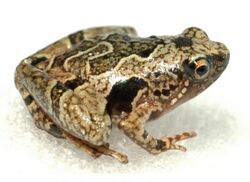Biology:Nanohyla petrigena
| Nanohyla petrigena | |
|---|---|

| |
| Scientific classification | |
| Domain: | Eukaryota |
| Kingdom: | Animalia |
| Phylum: | Chordata |
| Class: | Amphibia |
| Order: | Anura |
| Family: | Microhylidae |
| Genus: | Nanohyla |
| Species: | N. petrigena
|
| Binomial name | |
| Nanohyla petrigena (Inger and Frogner, 1979)
| |
| Synonyms[2] | |
| |
Nanohyla petrigena is a species of frog in the family Microhylidae.[2] It is found in northern and central Borneo (Brunei, southeastern Sabah and central Sarawak, Malaysia, and central Kalimantan, Indonesia) and in the Sulu Archipelago of the Philippines . The common names pothole narrow-mouthed frog and Kapit rice frog have been coined for the species.[1][2]
Taxonomy
N. petrigena was formerly placed in the genus Microhyla, but a 2021 study using morphological and phylogenetic evidence moved nine species (including N. petrigena) to a new genus, Nanohyla.[2][3]
Description
Nanohyla petrigena is a small frog: adult males measure 14–16 mm (0.6–0.6 in) and adult females 15–18 mm (0.6–0.7 in) in snout–vent length.[4] Its hands have only three fingers. The dorsum is colored in shades of brown. There are dark markings on the shoulder and a light band on the flank. The venter is dark with an irregular white blotch.[5]
The male advertisement call is a single, pulsed note, emitted in series consisting of maximally 15 notes. Call repetition rate is about 0.7 per second, declining towards the end of the series.[4]
Habitat and conservation
Nanohyla petrigena occurs in lowland primary rainforests at elevations below 700 m (2,300 ft).[1] It lives in leaf litter. Breeding takes place in small pot-holes on rocky banks of clear streams and rivers and appears to be restricted to certain nights.[1][4] The egg masses float on the surface of these pools.[4] The tadpoles feed in mid-water.[5]
This species appears not to be able to adapt to modified habitats. It is threatened by habitat loss caused by logging and conversion in palm oil plantations; the type locality has already been destroyed and species has likely disappeared from there. However, the species occurs in several protected areas.[1]
References
- ↑ 1.0 1.1 1.2 1.3 1.4 IUCN SSC Amphibian Specialist Group (2018). "Nanohyla petrigena". IUCN Red List of Threatened Species 2018: e.T57889A58478677. doi:10.2305/IUCN.UK.2018-2.RLTS.T57889A58478677.en. https://www.iucnredlist.org/species/57889/58478677. Retrieved 15 November 2021.
- ↑ 2.0 2.1 2.2 2.3 Frost, Darrel R. (2021). "Nanohyla petrigena (Inger and Frogner, 1979)". Amphibian Species of the World: An Online Reference. Version 6.1. American Museum of Natural History. doi:10.5531/db.vz.0001. https://amphibiansoftheworld.amnh.org/Amphibia/Anura/Microhylidae/Microhylinae/Nanohyla/Nanohyla-petrigena.
- ↑ Gorin, Vladislav A.; Scherz, Mark D.; Korost, Dmitriy V.; Poyarkov, Nikolay A. (2021-12-01). "Consequences of parallel miniaturisation in Microhylinae (Anura, Microhylidae), with the description of a new genus of diminutive South East Asian frogs" (in en). Zoosystematics and Evolution 97 (1): 21–54. doi:10.3897/zse.97.57968. https://zse.pensoft.net/article/57968/.
- ↑ 4.0 4.1 4.2 4.3 Dehling, J. M. (2010). "Advertisement calls of two species of Microhyla (Anura: Microhylidae) from Borneo". Salamandra 46 (2): 114–116. http://www.salamandra-journal.com/index.php/home/contents/2010-vol-46/96-dehling-j-m-2/file.
- ↑ 5.0 5.1 "Microhyla petrigena Pothole Narrow-mouthed Frog". Frogs of Borneo. 2017. http://www.frogsofborneo.org/microhylidae/257-microhylidae/microhyla/petrigena. Retrieved 2 March 2019.
Wikidata ☰ Q104835856 entry
 |


